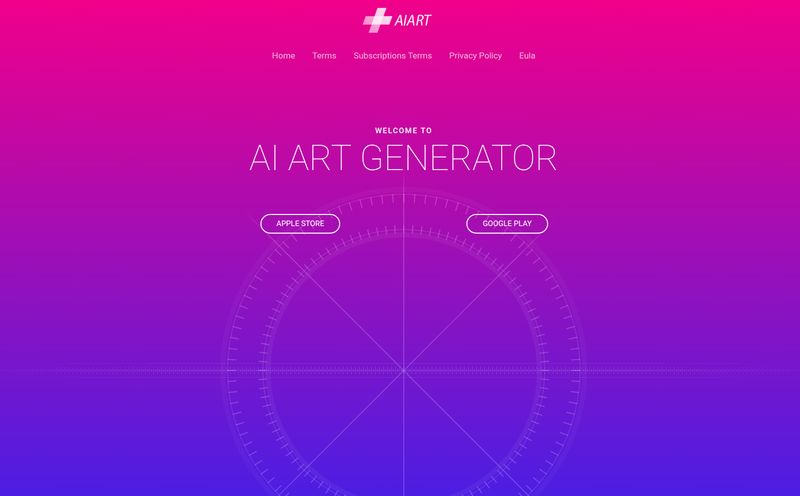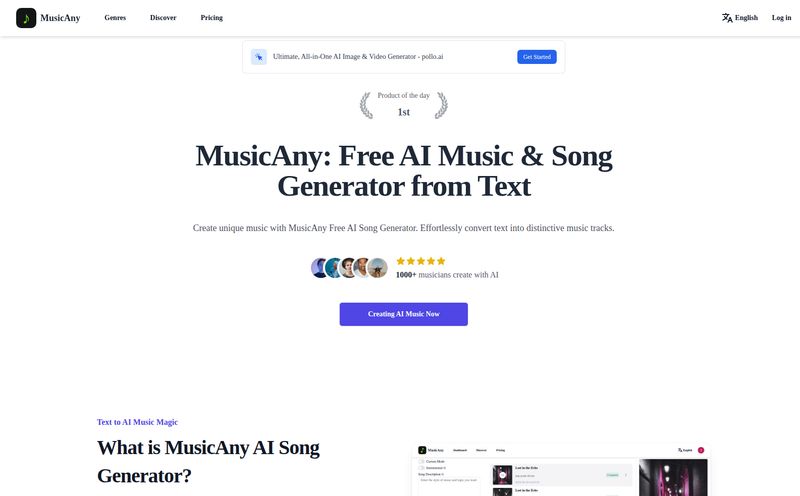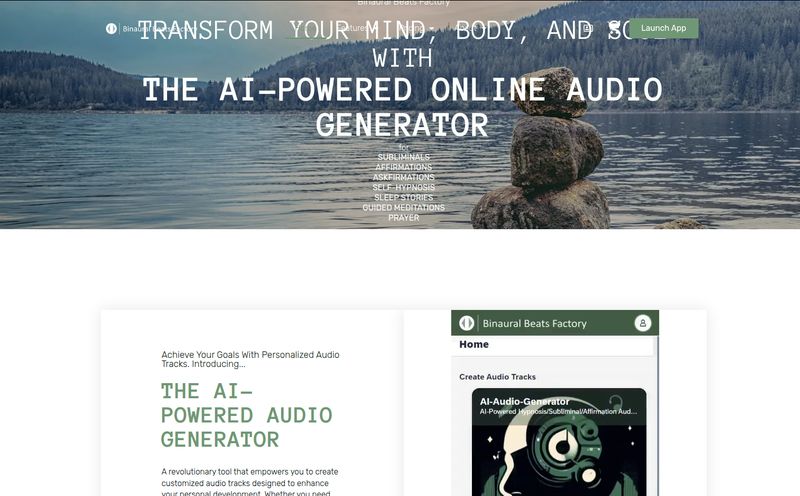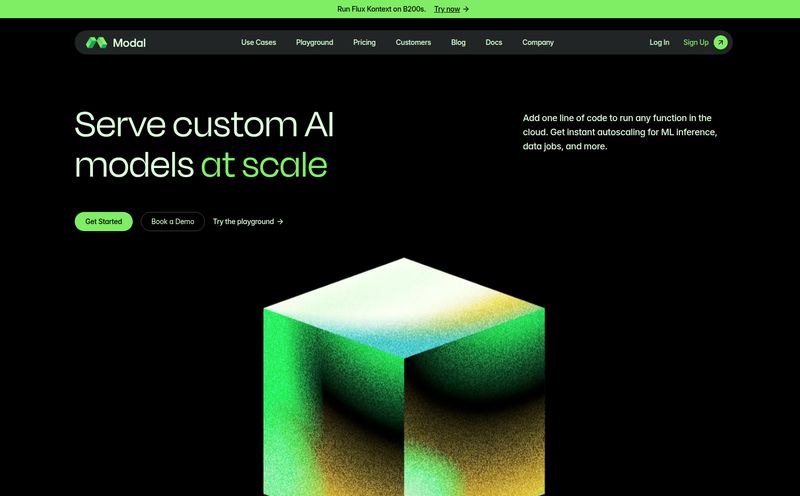If you’re a music producer, you've been there. It’s 2 AM. You've listened to 437 different kick drums. They all start to sound the same. One's too boomy, another's too clicky, and the one that's almost perfect has some weird reverb tail from 1998 that you can't get rid of. The creative spark you had an hour ago is now a faint, dying ember. This endless hunt for the perfect sample—we call it "digging in the crates," but let's be honest, it's often just scrolling through Splice—is a massive time sink. A necessary evil, right?
Well, maybe not. I've been hearing a lot of chatter lately about a company called Audialab, which claims to use AI to generate infinite, unique, royalty-free samples right inside your DAW. My inner skeptic immediately perked up. AI in music... it's a touchy subject. Is it a revolutionary new paintbrush, or is it a robot that's coming for our jobs? So, I decided to put my producer hat on, push the skepticism aside (mostly), and see if Audialab is just hype or the genuine article.
So What Exactly Is Audialab?
First off, Audialab isn't just one thing. It's a suite of AI-powered plugins designed to tackle different parts of the sample creation process. Think of it less like a sample pack and more like a little robotic assistant who's really, really good at sound design. The main idea is to stop recycling the same old sounds and start generating new ones that are completely your own. No more worrying if that snare you love has been used in a dozen other Top 40 hits.
Their lineup includes a few key players, each with a specific mission:
- Emergent Drums 2: This seems to be the star of the show. It’s a dedicated AI drum generator that creates entirely new drum samples from scratch. Not just variations, but brand-new sounds.
- Deep Sampler 2: This one feels like something out of science fiction. You literally describe a sound with words, and it generates it for you. Wild.
- Infinite Packs & Humanize: These tools focus on generating royalty-free packs and adding natural, human-like variations to your drum patterns to escape that robotic, perfectly-quantized feel.
The whole platform is built on the promise of a faster, more unique workflow. And frankly, who doesn't want that?
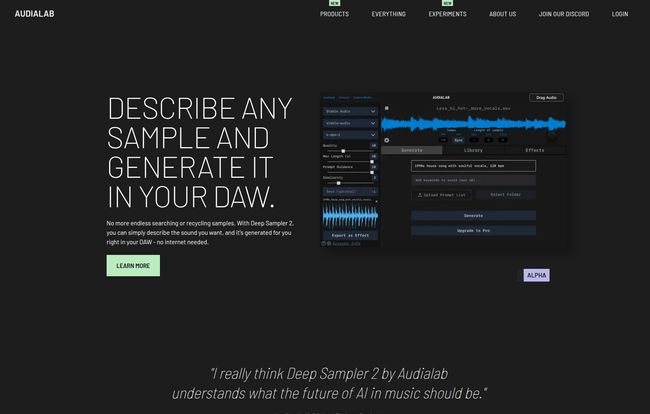
Visit Audialab
A Closer Look at The Tools in the Shed
Okay, let's break down the main components. A suite of tools is only as good as its individual parts, after all.
Emergent Drums 2: Your Personal Drum Factory
This is the one I was most excited about. The idea of an infinite drum machine is the holy grail for a lot of beatmakers. You open Emergent Drums 2, and you can generate endless samples. If you find a snare you kinda like, you can lock it in and generate variations of that specific sound. Want it deeper? More crack? A longer tail? You can nudge the AI in the right direction. This is a game-changer for creating a cohesive drum kit where all the sounds feel like they belong together, because, well, they were born together.
Deep Sampler 2: Speaking Sounds into Existence
Now, this is where things get a bit weird and wonderful. Deep Sampler 2 is currently in Alpha, which means it's still being developed, so expect some quirks. But the concept is just... wow. You type in something like "a metallic, wooden hit with a short, rattling decay," and it attempts to create that sound. The quote I saw from producer Alex Castillo really stuck with me:
I really think Deep Sampler 2 by Audialab understands what the future of AI in music should be.
It's about collaboration with the machine, not replacement. It’s a tool that works offline, right in your DAW, which is a huge plus for those of us who don't want our creative process tethered to an internet connection.
Infinite Packs and Humanize
These two are also in Alpha but they fill important gaps. Infinite Packs is your answer to generating entire collections of royalty-free sounds on a theme, while Humanize is for breaking the curse of the rigid grid. It introduces tiny, almost imperceptible variations in velocity and timing to your drum samples. It’s like the digital version of a drummer who’s had just the right amount of coffee—tight, but not robotic.
The AI Debate: Creative Partner or Soulless Machine?
I can already hear some of my producer friends groaning. "AI-generated drums? That's not authentic!" And I get it. There's a certain romance to digging for that perfect, obscure vinyl sample. There’s a craft to painstakingly layering three different snares to get the right texture.
But here’s my take: this isn’t about replacing creativity; it's about augmenting it. Think about when synthesizers first appeared. Many acoustic musicians probably saw them as soulless, artificial noise-makers. Now, they're an indispensable tool for countless genres. Audialab feels similar. It’s a new instrument. It’s a way to get a completely unique starting point that you can then process, chop, and mangle to your heart's content. It removes the most tedious part of the process—the search—so you can spend more time on the fun part: the creation.
It's not about letting the AI write the song for you. It's about asking it for a very specific color of paint that you can't find anywhere else, so you can finish your masterpiece.
The Real-World Experience: The Good and The Glitchy
So what's the verdict after playing around with it? It’s impressive. Genuinely impressive. The ability to generate a kick drum and then immediately ask for 16 variations saves an insane amount of time. The sounds coming out of Emergent Drums 2 are high-quality and, most importantly, usable. They sit well in a mix and don't have that weird, thin quality that some procedural generation tools can spit out.
However, it's not a magic bullet. The fact that several products are in Alpha is something to be aware of. You might run into the occasional bug or unexpected result. For some, the reliance on AI might feel like giving up a bit of control. If you're a sound designer who loves getting your hands dirty with every single waveform, you might find it a bit abstract. But if you’re a producer focused on songwriting and arrangement, the trade-off is absolutely worth it.
The Price of Progress: Audialab's Pricing Structure
Okay, let's talk cash. How much will this AI assistant set you back? They've got a few options, which is nice. It isn't a one-size-fits-all deal.
| Plan | Price | What You Get |
|---|---|---|
| Audialab Everything (Monthly) | $7 /month AUD | Access to all current and future products. |
| Audialab Everything (One-Time) | $189 (One-Time) | Lifetime access to all products. |
| Emergent Drums 2 (Standalone) | $199 (One-Time) | Just the Emergent Drums 2 plugin. |
My two cents? The monthly subscription is a fantastic way to dip your toes in without a huge commitment. But if you find yourself using it consistently, the $189 one-time purchase for everything is a steal. It's actually cheaper than buying Emergent Drums 2 by itself, which is a bit of a head-scratcher but I'm not complaining. For less than the price of some single premium plugins from other companies, you get a whole suite of futuristic tools. It feels like a pretty solid investment in your workflow.
Frequently Asked Questions about Audialab
1. Are the samples from Audialab really royalty-free?
Yes. According to Audialab, every sample you generate is 100% yours and completely royalty-free. This is a massive advantage, as you can use them in your commercial releases without any legal headaches or clearance issues. It’s one of the platform's biggest selling points.
2. Do I need to be online to use Audialab's tools?
Nope! A big benefit, especially with Deep Sampler 2, is that the tools work offline directly within your Digital Audio Workstation (DAW). Once installed, you don't need an internet connection to generate sounds, which is great for studio sessions or working on the go.
3. What DAWs are compatible with Audialab?
Audialab plugins are designed to work with most major DAWs that support VST3 or AU plugin formats. This includes popular choices like Ableton Live, FL Studio, Logic Pro X, Cubase, and others. Always check their site for the most up-to-date compatibility list before purchasing.
4. What does it mean that some products are in 'Alpha'?
Alpha is an early stage of software development. It means the product is functional but may still have bugs, incomplete features, or undergo significant changes. It's a way for users to get early access and provide feedback, but you should expect it to be less stable than a fully released product.
5. Can I just buy one tool, like Emergent Drums 2?
Yes, you can purchase Emergent Drums 2 as a standalone product. However, as of their current pricing, the 'Audialab Everything' one-time purchase is often a better value, giving you all their tools for a similar (or even lower) price.
Final Thoughts: Is Audialab Worth It?
After spending some quality time with these tools, I'm genuinely excited. Audialab isn’t just another plugin; it feels like a glimpse into the future of music production. It's a smart, efficient, and endlessly creative partner that solves one of the most tedious problems we face as producers. While the Alpha products show it's still a platform that's growing, the core functionality, especially in Emergent Drums 2, is already rock-solid and incredibly powerful.
It won't replace the artist. It won't write your next hit for you. But it will give you a brand-new palette of sounds that no one else has, and it'll give you back the one thing we can never get more of: time. And for that reason alone, I think Audialab is something special.
